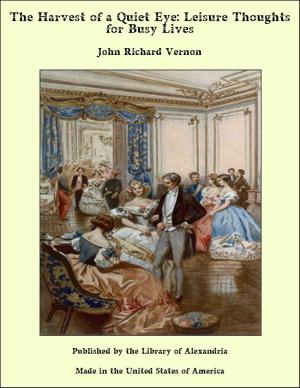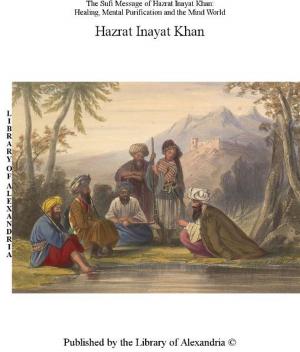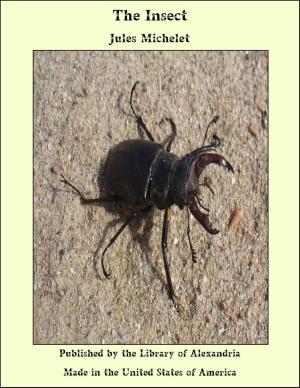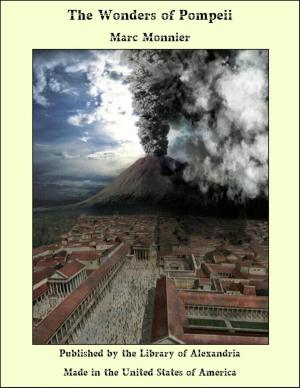Pink Gods and Blue Demons
Nonfiction, Religion & Spirituality, New Age, History, Fiction & Literature| Author: | Cynthia Stockley | ISBN: | 9781465584755 |
| Publisher: | Library of Alexandria | Publication: | March 8, 2015 |
| Imprint: | Language: | English |
| Author: | Cynthia Stockley |
| ISBN: | 9781465584755 |
| Publisher: | Library of Alexandria |
| Publication: | March 8, 2015 |
| Imprint: | |
| Language: | English |
Kimberley was once the most famous diamond diggings in the world. Rhodes founded his fortunes there, and the friendships that backed him throughout his career. In the tented camps, hundreds of men became millionaires, and hundreds of others went to jail for the crime of I.D.B. (illicit diamond buying). Later, stately buildings and comfortable homes took the place of tent and tin hut, and later still, the town, like a good many other mining towns in South Africa, became G.I. A mine is G.I. (meaning “gone in”) when there is no longer any output. This was hardly true of Kimberley. It continues until this day to put out diamonds, and still may be found there “the largest hole in the world.” But Kimberley’s day was over when gold was found in the Transvaal, and the adventuring crowd left it, never to return. At the present time, it is chiefly remarkable for its scandals, dust, heat, and the best hotel in South Africa, which is not so much a hotel as a palatial country house started by the De Beers magnates for the entertainment of their friends or for their own use when they are bored with home life. Notabilities are often entertained there as guests of the famous company, but, even if not a guest of De Beers’, a traveller may stay at the Belgrove for about a pound a day and be silent and cool as in an ice-house while all the rest of Kimberley is a raging furnace. Mr Rhodes entertained General French at dinner here after the relief of Kimberley. There is a picture over the dining-room mantelpiece of the two men meeting on the famous occasion of the relief of Kimberley. Loree Temple, seated at a table just below it, looked often at this picture and then contemplatively at her own image in a mirror on the wall. It seemed a pity that Rhodes was dead, the Boer War over and all the mining adventurers gone away. She would have liked to live and love among such men instead of being married to Pat Temple. None but the brave deserve the fair, and she imagined her beauty adorning a scene of “triumph and roses and wine” when gallantry returned to white arms and the soft rewards of victory. She had often dreamed herself back in ancient Rome, seated in a chariot beside some blood-stained general, with pearls strung in her hair and immense uncut rubies and emeralds against her dazzling whiteness. Or perhaps led into the banquet as a slave, with chains upon her wrists, part of the spoils of war, proud and sad and exquisite in her doom.
Kimberley was once the most famous diamond diggings in the world. Rhodes founded his fortunes there, and the friendships that backed him throughout his career. In the tented camps, hundreds of men became millionaires, and hundreds of others went to jail for the crime of I.D.B. (illicit diamond buying). Later, stately buildings and comfortable homes took the place of tent and tin hut, and later still, the town, like a good many other mining towns in South Africa, became G.I. A mine is G.I. (meaning “gone in”) when there is no longer any output. This was hardly true of Kimberley. It continues until this day to put out diamonds, and still may be found there “the largest hole in the world.” But Kimberley’s day was over when gold was found in the Transvaal, and the adventuring crowd left it, never to return. At the present time, it is chiefly remarkable for its scandals, dust, heat, and the best hotel in South Africa, which is not so much a hotel as a palatial country house started by the De Beers magnates for the entertainment of their friends or for their own use when they are bored with home life. Notabilities are often entertained there as guests of the famous company, but, even if not a guest of De Beers’, a traveller may stay at the Belgrove for about a pound a day and be silent and cool as in an ice-house while all the rest of Kimberley is a raging furnace. Mr Rhodes entertained General French at dinner here after the relief of Kimberley. There is a picture over the dining-room mantelpiece of the two men meeting on the famous occasion of the relief of Kimberley. Loree Temple, seated at a table just below it, looked often at this picture and then contemplatively at her own image in a mirror on the wall. It seemed a pity that Rhodes was dead, the Boer War over and all the mining adventurers gone away. She would have liked to live and love among such men instead of being married to Pat Temple. None but the brave deserve the fair, and she imagined her beauty adorning a scene of “triumph and roses and wine” when gallantry returned to white arms and the soft rewards of victory. She had often dreamed herself back in ancient Rome, seated in a chariot beside some blood-stained general, with pearls strung in her hair and immense uncut rubies and emeralds against her dazzling whiteness. Or perhaps led into the banquet as a slave, with chains upon her wrists, part of the spoils of war, proud and sad and exquisite in her doom.















